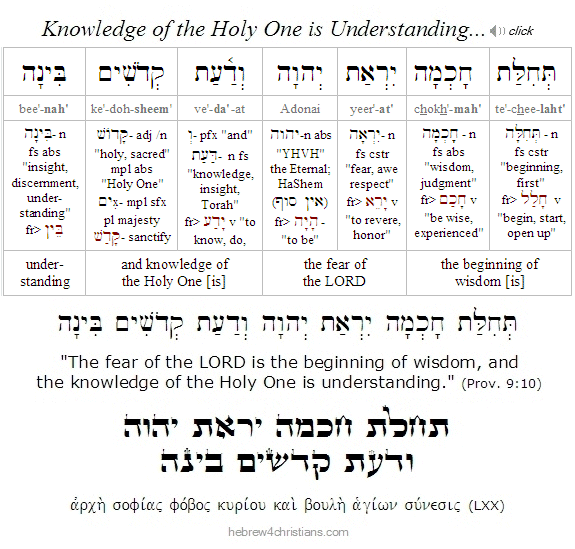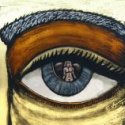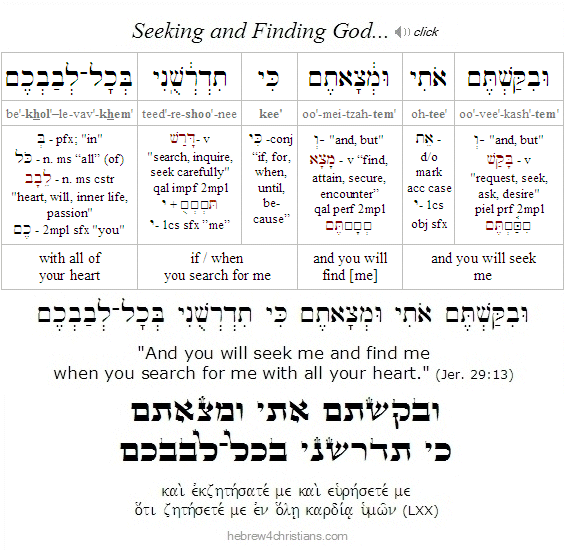|
WHAT WILL YOU CHOOSE to believe - the "spying eyes" of the flesh, or the Word and promise of the LORD God Almighty? The "eyes of the flesh" focus on this world and its possibilities (חַיֵּי שָׁעָה) and are therefore unable to discern beyond mere surface appearances. They are easily seduced by superficialities and glitter (עוֹלָם הַשֶּׁקֶר). The eyes of faith, on the other hand, "look not to the things that are seen but to the things that are unseen. For the things that are seen are transient, but the things that are unseen are eternal" (2 Cor. 4:18). Faith sees the realm of the invisible (חַיֵּי עוֹלָם): For we "walk by faith, not by sight." We are "saved by hope," but hope that is seen is not hope (Rom. 8:24-25). Faith is the foundation (ὑπόστασις) of things hoped for, the conviction (ἔλεγχος) of things (πρᾶγμα) not seen" (Heb. 11:1).
It had only been 13 months since the Israelites had witnessed the awesome power of God deliver them from Egypt. Surely the people vividly remembered how God sent ten great plagues upon Egypt, forcing the wicked Pharaoh to finally relent and let them go; surely they recalled how the Sea of Reeds was miraculously split in two as they walked across on dry land. Were they not overjoyed when they sang about how God had decisively vanquished the power of Egypt as the waters returned over the pursuing armies? And when their food ran out, had not God sent them ha-motzi min ha-shamayim - "the bread from heaven"? When there was no water to be found, had not God provided them with "living water"? Did not the Pillar of Cloud and Fire lead them to Sinai, where they felt the tremor of the great revelation from heaven - the fire, earthquakes, and blasts from the heavenly shofar? Did they not hear the very Voice of the LORD speaking to them from the thick darkness? Did not the 70 elders of Israel eat the covenant ratification meal and behold the glory of God? Wasn't it just a few months later, after Moses explained to the people the laws of the Torah and assembled the Tabernacle in their midst, that the people saw the Shekhinah Glory of God descend from the summit of Sinai to dwell over the sanctuary? Did they not fall on their faces as the fire of the LORD consumed the sacrifices on the altar?
And yet, in a sense, these displays of divine power - these "signs and wonders" - were something of a distraction for the eye of faith, since faith does not confuse the means for the end. For example, the manna that fell was meant to keep people alive, but that life was to be lived in trusting relationship with the Living God.
Recall that the Israelites had camped near Mount Sinai for nearly a year before God commanded them to begin their journey through the desert back to the Promised Land. It was at Sinai that Moses had first set up the Mishkan (i.e., Tabernacle), dedicated the priesthood, and taught the people the commandments of the Torah. In the "second year, in the second month, on the 20th day of the month" (i.e., Iyyar 20), the cloud lifted from over the Tabernacle and Moses dispatched the Ark of the Covenant to follow after it into the desert (Num. 10:33-6). Moses then directed the people to set out "by stages" toward the desert of Paran (in the Negev). First the eastern camp led by Judah set out, which was followed by the Levites who moved the Tabernacle. Then the southern camp of Reuben set out, followed by the Kohathites who carried the Tabernacle's sacred furnishings (e.g., the menorah, the altar of incense, etc.). Then the western camp of Ephraim set out, followed by the northern camp of Dan which served as a "rear guard."
In our Torah portion, the Israelites had trekked across the desert of Paran for several days, with their camps ordered in military precision. The Ark of the Covenant was in their midst and the Shekhinah Glory filled the desert skies. Now the people were at Kadesh Barnea (קָדֵשׁ בַּרְנֵעַ), about 11 days out from Sinai and about three days to the Promised Land, at the very edge of the conquest.... Zion was within reach!
But then a dark misgiving arose within the heart of the people... fear ... the old whisper of the enemy was heard in the desert wind: "has God really said...?" (Gen. 3:1). The enemy's voice always solicits and plays on our fears.... Satan is a liar who seeks to take our heart away. He is a bully who first seeks to intimidate us and then attempts to damn us for accepting his lies... Nonetheless, despite his temptation in the wilderness, the people's lack of trust in God's provision is altogether remarkable, and very nearly incomprehensible. The people had seen so much evidence of God's care for them, and yet they seemed to be driven by the vexation of fear. We learn later that it was the people's desire - based on their fear - to send out the spies, and surely not the result of God's command (Deut. 1:21-33). Indeed, shelach lekha (שְׁלַח־לְךָ) means "send for your own sake," that is, send them based on your request - certainly not because I command this thing... Was there a secret wound at work here? Did the people somehow suspect that God's discipline was a sign of His disfavor? Was the old accusation that Moses had led the people into the desert to die still inwardly being harbored (Exod. 14:11-12, cp. Num. 14:3)? Perhaps the idea of being in relationship with a Holy God proved to be more than what was bargained for... Salvation and provision are fine, but the fiery judgments proved there was something far more was required... After all, it is one thing to dabble in religion, but it is quite another to encounter the Reality of the Divine and entirely Holy Presence, and indeed, to become infinitely accountable to Him.
The mistrust of the people reminds us that miracles are always insufficient to sustain our faith. "An evil and adulterous generation seeks for a sign." Seeing isn't believing, but rather the other way around.... Yeshua made this point in His parable of the rich man and Lazarus (Luke 16:19-31). Even if a person should encounter someone literally risen from the dead it wouldn't suffice to impart true faith (Luke 16:31). The great sin that so angered God to say, "I swore in My wrath, They shall not enter into My rest..." was not that of the Golden Calf, as dreadful as that was, but rather the sin of unbelief.... "So we see that they could not enter in because of unbelief. Let us, therefore, fear lest, a promise being left us of entering into His rest, any of you should seem to come short of it" (Heb. 3:7-4:2).
The report given by the spies was a function of their faith: "According to your faith, be it done unto you." "Out of the abundance of the heart, the mouth speaks." Faith sees what is possible and refuses to yield to the artificiality of mere appearance. When Moses told the twelve spies to "Go up into the Negev and go up into the hill country, and see what the land is, and whether the people who dwell in it are strong or weak, whether they are few or many, and whether the land that they dwell in is good or bad" (Num. 13:18-19), he certainly did not need the opinion of the spies regarding the land and its qualities. After all, God Himself had told him the land was very good, a "land flowing with milk and honey." In a sense, Moses - and God through him - was testing the spies, to see if they had faith to see beyond mere appearances. "Even if the land seems bad in your eyes, declare that it is good... Do not rely on your initial impressions, since in order to see the promise, you must look beyond what is immediately visible."
All the spies saw the same physical phenomena: They saw the land "that devours its inhabitants," they beheld the heavy fortifications, they shrank back before the "giants" that dwelled there, and so on. The "majority" view was that the land was unassailable and that danger awaited the people... However, Joshua and Caleb exercised genuine faith and refused to regard themselves as "grasshoppers" before the enemy. Despite seeing the same obstacles, they beheld the future promise of the LORD and understood their stature as God's beloved children... The test of faith turned on the identity of the spies themselves. Were they "grasshoppers" or were they ambassadors of the Living God?
Some of the sages have said that the LORD allowed this shelach lekha - this "test of faith" - in order to judge the perfidy of the Exodus generation. In the aftermath of their failure, the LORD said, "But truly, as I live, and as all the earth shall be filled with the glory of the LORD, none of the men who have seen my glory and my signs that I did in Egypt and in the wilderness, and yet have put me to the test these ten times and have not obeyed my voice, shall see the land that I swore to give to their fathers. And none of those who despised me shall see it" (Num. 14:21-23). The midrash rabbah likens their fate to the story of a royal prince who reached marriageable age. His father then arranged a suitable match and chose a young lady of royal pedigree who was intelligent, beautiful, and charming. The son, however, insisted on first meeting the prospective mate. The father, of course, was deeply hurt by his son's lack of trust in him, and therefore reasoned: "If I refuse to allow them to meet, my son will be convinced that his doubts were justified. I will therefore allow them to meet to vindicate my choice. However, since he didn't trust me, I will not allow him to marry her." When the Israelites of that generation questioned God's word, God allowed them to send spies, to see with their own eyes that the land was good. However, since the people doubted His word, they would not be allowed to inhabit it.
As the Book of Hebrews makes clear, the theme of this week's Torah portion concerns the essential nature of salvation itself, which comes exclusively through trusting in God's love and grace as given in Yeshua - χάριτί ἐστε σεσῳσμένοι διὰ πίστεως (Eph. 2:8). The essence of the Torah has always been: הַצַּדִּיק בֶּאֱמוּנָתוֹ יִחְיֶה / "the righteous shall live by his faith" (Hab. 2:4; Heb. 10:38). Believing in the manifestation of the miraculous is insufficient for faith, and indeed, in the end of the age there will arise one who through lying signs and wonders will induce "strong delusion" to deceive the people of this world (2 Thess. 2:9-12). Regarding the case of the Israelites, what has struck some commentators is not so much the signs and wonders that the LORD performed on their behalf, but rather their persistent inability or unwillingness to believe... After all, truly loving the LORD with all your heart, with all your soul, and with all your strength is a miracle of a greater kind than that of splitting the Sea of Reeds. The heart of faith does not seek the miraculous, but is transformed by God's miraculous power into a testimony of His faithful love.
Hebrew Lesson:
Jeremiah 29:13 Hebrew reading (click):
Addendum: Note that the Hebrew word for "seeing" (ra'ah) is related to the word for "fear" (yirah), suggesting that when we really see life as it is, we will be filled with wonder and awe over the glory of it all. Every bush will be aflame with the Presence of God and the ground we walk upon shall suddenly be perceived as holy (Exod. 3:2-5). Nothing will seem small, trivial, or insignificant. It is in this sense that we are to serve the LORD with "fear and trembling" (φόβοv καὶ τρόμοv), that is, with an inner awareness of the sanctity and sacredness of life itself (Phil. 2:12-13). Da lifnei mi atah omed. Sin puts us to sleep, numbs our minds and hearts, and blinds us to the radiance of divine revelation. When we see life as it is, with the "eyes of the heart" (Eph. 1:18), we will be filled with wonder and awe over the glory of it all. "Fearing" (יִרְאָה) and "seeing" (רָאָה) will be unified within our hearts... and we will be wise (Prov. 9:10).
Hebrew Lesson:
Proverbs 9:10 Hebrew reading (click):
 |
|




